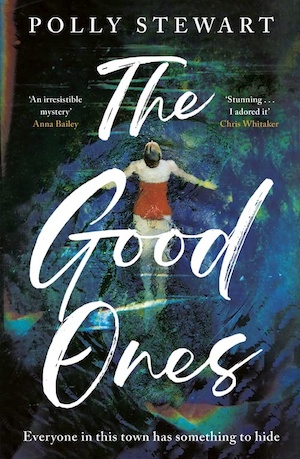
Two ways to sum up the experience of reading Polly Stewart’s mystery/thriller The Good Ones come immediately to mind. One is: ‘Everyone’s a hero of their own story,’ and narrator Nicola Bennett is fixated on what she sees as her own role in the disappearance – and possible murder – of her best friend Lauren Ballard nearly 20 years earlier. Secondly, as in the words of a famous Southern writer: ‘You can’t go home again.’ But, as you’ll see, that’s what Nicola does.
Nicola dwells on her and Lauren’s experiences on the high school soccer team, the drunken teenage parties and female rivalries, Lauren’s mean streak, and how she and Lauren were dating two wealthy brothers. Lauren, pregnant, married Warren before she was 20; Nicola and Sean broke up. Then one night when Warren and Sean were out of town, Lauren disappeared from home, leaving behind a bloody washcloth and signs of a struggle. Whatever went wrong that night and in the weeks afterward, Nicola believes she instigated it.
Perhaps all this is so hyper-present in Nicola’s mind because she’s just returned to the fictional Tyndall County in rural Virginia, where she grew up. She’s back to be with her dying mother, and now she’s fixing up their dishevelled home for sale. Nicola was at a loose end, anyway, having lost her job teaching at a small college out west. Now she’s offered a temporary position at the local high school, which will support her while she works on the house.
Even when living on the West Coast, Nicola was keeping questions about Lauren’s fate alive. She started a Reddit page entitled LaurenBallardDisappearance, which, as the novel progresses, is showing an unexpected uptick in activity.
There’s surprisingly little else filling out the dimensions of Nicola’s daily life – not much about the renovation, her job or her plans after Tyndall County. What you do learn is that her old flame Sean may still be interested in her. He’s the principal of the high school where she’s teaching, and Tyndall County parents can be grateful that he at least has grown up. His brother Warren – Lauren’s husband – is Nicola’s real estate agent. There’s a strong mutual attraction between them, and a lusty affair develops.
Meanwhile, someone is placing threatening messages where Nicola will find them. ‘No one wants you here’ in red letters, with inked-in blood drops. That isn’t the full extent of the harassment, but Nicola seems only intermittently troubled by the danger they may represent. Her lack of anxiety keeps The Good Ones from being a tension-filled thriller. Certainly, whatever concerns she has don’t stop her from investigating the house where Lauren was found – alone, at night, in the dark, of course.
She does seem to realise that the more she pushes to find out what happened to Lauren, the greater the possible danger to herself. This is especially true since her principal suspects are Warren or Sean, or Warren and Sean. Could either of them be a murderer? Could Lauren’s daughter Mabry be the stalker? Mabry says she’s OK with her father’s affair with Nicola, but is she really? Early on, author Polly Stewart dangles an alternative possibility, with several mentions of the book Jane Eyre, which Nicola loaned Sean years before. As she explores the old family mansion by the light of her cell phone – Southern Gothic creepy – I couldn’t help remembering that foreshadowing.
I’ve recently read several excellent books about rural life and rural Virginia, in particular, and Tyndall County lacks their down-and-out vibe. Generally, the characters here live on the right side of the tracks. They have middle and upper-middle class preoccupations. Yet, the author certainly captures the high school atmosphere in Nicola’s flashbacks: the insularity, the tightly closed social circles, the pressure not to be different. It’s all there, in all its behaviour-warping glory.
This book also touches on the issue of true crime ‘investigations’ via social media. The Reddit sleuths don’t do more than keep the story going, perhaps because all these years later, there’s not much boots-on-the-ground investigating for them to do. There’s much food for thought in how people’s private pain is being turned into public entertainment.
The writing style of this book is certainly accomplished, though, like several characters in the story, I’m not drawn to endlessly reliving high school dramas. You can only hope that, once she has the answers she’s seeking, Nicola finally moves on.
For more social media overreach try The Pain Tourist by Paul Cleave or, for more rural noir, see Back to the Dirt by Frank Bill.
Constable
Print/Kindle
£9.99
CFL Rating: 3 Stars










